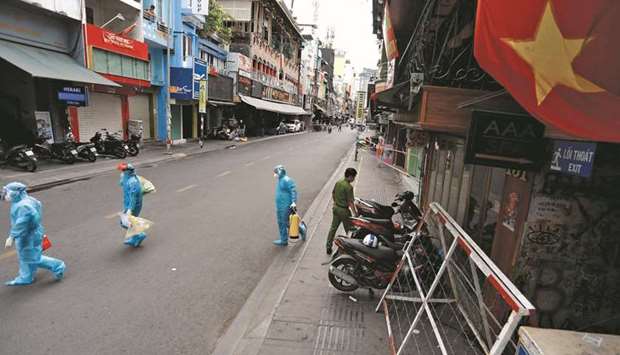South Korea reported 1,378 new coronavirus (Covid-19) cases yesterday, a record high for the third day in a row as the country prepared to impose its highest-level curbs in the greater capital area next week.
The country had previously been held up as a model of how to combat the pandemic, with the public largely following social distancing and other rules, but it was slow to start its vaccine roll-out due to supply shortages.
More than 1,000 of the new cases were in the capital Seoul and its surrounding areas, home to around half the South Korean population.
Clusters have recently surfaced in areas, including schools, offices and shopping malls, with people in their 20s and 30s – most of whom are not yet eligible for vaccinations – driving up the numbers.
Only about 11% of the country’s 52mn population is fully vaccinated, according to health authorities.
On Friday, Prime Minister Kim Boo-kyum said the record spike in new cases left authorities no choice but to implement the highest-level curbs.
Under the new restrictions, set to come into force tomorrow and last for two weeks, gatherings of more than two people will be banned after 6pm and schools will be closed.
Nightspots will be shut, while cafes and restaurants are allowed limited seating and dine-in services are prohibited after 10pm.
Australia’s New South Wales state meanwhile reported yesterday its biggest daily rise in locally-acquired coronavirus infections this year, with authorities warning that worse may yet to come for Sydney, which is in a three-week hard lockdown.
There were 50 new cases of community transmission in the country’s most populous state, up from 44 a day earlier, the previous 2021 record high.
This brings the outbreak of the highly-infectious Delta variant to 489 cases.
Of yesterday’s cases, 26 were people who had spent time in the community while they were infectious, deepening concerns that the lockdown of more than 5mn people in Sydney and surroundings will be extended.
“When you know that there are 26 cases infectious in the community, the only conclusion we can draw is that things are going to get worse before they get better,” state Premier Gladys Berejiklian told a televised briefing.
“I think it is pretty clear that unless we reduce that level of people in the community that are infectious, we won’t be able to turn things around as quickly as we can or as quickly as we should,” she added.
There are 47 cases in hospital, or about one in 10 people infected in the current outbreak.
Of those, 19 people are under the age of 55 and 16 people are in intensive care, including a teenager.
No fully vaccinated people have required hospital care and 79% of those admitted have not had any doses, health authorities said.
Vaccinations are available in Australia for now only to people over 40 and those in risk groups either due to their health or work.
The country has fared much better than many other developed countries in keeping its Covid-19 numbers relatively low, but its vaccination rollout has been among the slowest due to supply constraints and changing medical advice for its mainstay AstraZeneca.
Yesterday Vietnam reported 1,853 Covid-19 infections, a new record daily increase.
Most of the cases were in the epicentre Ho Chi Minh City, which on Friday began 15 days of broad movement restrictions.
Vietnam has meanwhile received 2mn doses of the Moderna vaccine donated by the US government, the American embassy in Hanoi said yesterday.
The shipment, delivered via the Covax sharing facility, is part of the 80mn vaccine doses that President Joe Biden committed from US vaccine supplies to support global needs, the embassy said in an e-mailed statement.
Half of the doses that arrived yesterday – the country’s first Moderna shots – will be funnelled to Ho Chi Minh City’s 9mn people, state media said.
Vietnam has received around 8mn vaccine doses so far, mostly under the international Covax sharing facility.
More than 4mn doses have been administered, but only about 258,000 people have been fully vaccinated out of a population of 98mn.
The health ministry said on Friday that it aimed to vaccinate 50% of people aged 18 or older by the end of the year and 70% by the end of March 2022.

Medical workers collecting test samples from residents are seen in Ho Chi Minh City.
